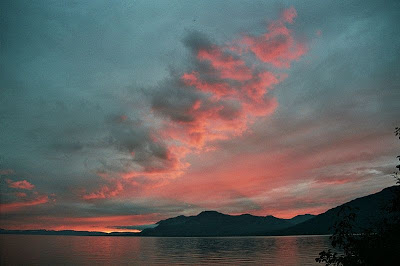Wednesday, July 24, 2013
Cost of Arctic methane release could be ‘size of global economy’ warn experts
University of Cambridge Research News: Economic modelling shows that the possible methane emissions caused by shrinking sea ice from just one area of the Arctic could come with a global price tag of 60 trillion dollars - the size of the world economy in 2012.
As the Arctic warms and sea ice melts at an unprecedented rate, hitting a record low last summer, the thawing of offshore ‘permafrost’ - frozen soil - in the region is releasing methane, a powerful greenhouse gas.
Scientists have previously warned that there are vast reservoirs of methane in the Arctic, hundreds of billions of tonnes of a gas many times worse than carbon dioxide for global warming - of which only a fraction needs releasing into the atmosphere to trigger possibly catastrophic climate change.
Now, researchers from Cambridge and Rotterdam have for the first time calculated the potential economic impact of a scenario some scientists consider increasingly likely: that the methane below the East Siberian Sea will be emitted, either steadily over the next 30 years or in one giant “burp”.
Writing in the journal Nature, the academics say that just this area’s methane alone - some 50 billion tonnes, or 50 gigatonnes - would have a mean global impact of 60 trillion dollars, an amount very similar to the size of the entire global economy last year. Current US national debt stands at a mere 16 trillion dollars in comparison.
The economic impact modelled was only for the methane existing on the East Siberian Arctic Shelf, and “the total price of Arctic change will be much higher,” they warn...
“Arctic science is a strategic asset for human economies because the region drives critical effects in our biophysical, political and economic systems,” write the academics, who say that world leaders will “miss the bigger picture” without factoring in Arctic methane projections - as neither the World Economic Forum or the International Monetary Fund currently recognise the economic danger of Arctic change...
Lama Lake on the Putorana Plateau in Siberia, shot by Vitaly Repin, Wikimedia Commons, under the Creative Commons Attribution-Share Alike 3.0 Unported license
As the Arctic warms and sea ice melts at an unprecedented rate, hitting a record low last summer, the thawing of offshore ‘permafrost’ - frozen soil - in the region is releasing methane, a powerful greenhouse gas.
Scientists have previously warned that there are vast reservoirs of methane in the Arctic, hundreds of billions of tonnes of a gas many times worse than carbon dioxide for global warming - of which only a fraction needs releasing into the atmosphere to trigger possibly catastrophic climate change.
Now, researchers from Cambridge and Rotterdam have for the first time calculated the potential economic impact of a scenario some scientists consider increasingly likely: that the methane below the East Siberian Sea will be emitted, either steadily over the next 30 years or in one giant “burp”.
Writing in the journal Nature, the academics say that just this area’s methane alone - some 50 billion tonnes, or 50 gigatonnes - would have a mean global impact of 60 trillion dollars, an amount very similar to the size of the entire global economy last year. Current US national debt stands at a mere 16 trillion dollars in comparison.
The economic impact modelled was only for the methane existing on the East Siberian Arctic Shelf, and “the total price of Arctic change will be much higher,” they warn...
“Arctic science is a strategic asset for human economies because the region drives critical effects in our biophysical, political and economic systems,” write the academics, who say that world leaders will “miss the bigger picture” without factoring in Arctic methane projections - as neither the World Economic Forum or the International Monetary Fund currently recognise the economic danger of Arctic change...
Lama Lake on the Putorana Plateau in Siberia, shot by Vitaly Repin, Wikimedia Commons, under the Creative Commons Attribution-Share Alike 3.0 Unported license
Labels:
arctic,
catastrophe,
economics,
methane
Subscribe to:
Post Comments (Atom)




No comments:
Post a Comment